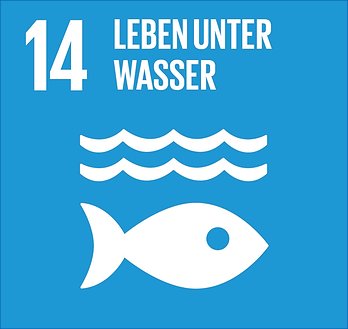SDG 14: Life Below Water
SDG 14 calls on us to conserve and sustainably use the oceans, seas, and marine resources for sustainable development. The focus is on preserving and protecting biodiversity as well as sustainable use and fair distribution of benefits.

Sponsorship team
Prof. Dr. Inga Hense
Faculty: Mathematics, Informatics and Natural Sciences
Department(s): Biology and Center for Earth System Research and Sustainability (CEN)
Profile: Prof. Dr. Inga Hense
What are your research areas? What research projects are you currently working on? How do these relate to “your” SDG?
My research area is marine ecosystem modeling with a focus on plankton dynamics. Life underwater as we know it is only possible because of phytoplankton. Changes in phytoplankton have a far-reaching impact on the ocean food chain and, as a result of fishing, on us humans as well. In one current research project we are studying whether marine plankton has evolutionarily adapted to rising temperatures in the past decades and if so, how. Some types of plankton can contribute to nitrogen fertilization in the ocean. The scope of this biological nitrogen input in the Baltic Sea in pre-industrial times, today, and in the future is the subject of another research project in which I am involved. While the role of phytoplankton in the food chain and material cycles is relatively well known, many other fundamental questions regarding its role in the climate system remain unanswered. In two additional research projects, we are therefore studying biological and physical feedback processes and the role of marine biota in carbon management.
How and why did you become interested in this topic?
As a trained marine biologist, “Life Below Water” is my research topic. As a scientist involved in the Climate, Climatic Change, and Society (CLICCS) cluster of excellence, I am interested in the role marine organisms actually and can play in the climate system, what changes we can expect in the future, and if there are already signs of adaptations in marine organisms as a result of climate change.
Prof. Dr. Christian Möllmann
Faculty: Mathematics, Informatics and Natural Sciences
Department(s): Biology
Profile: Prof. Dr. Christian Möllmann
